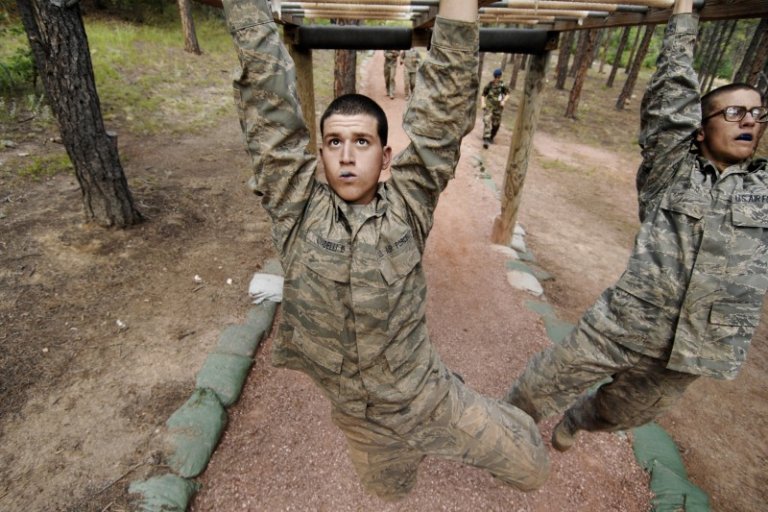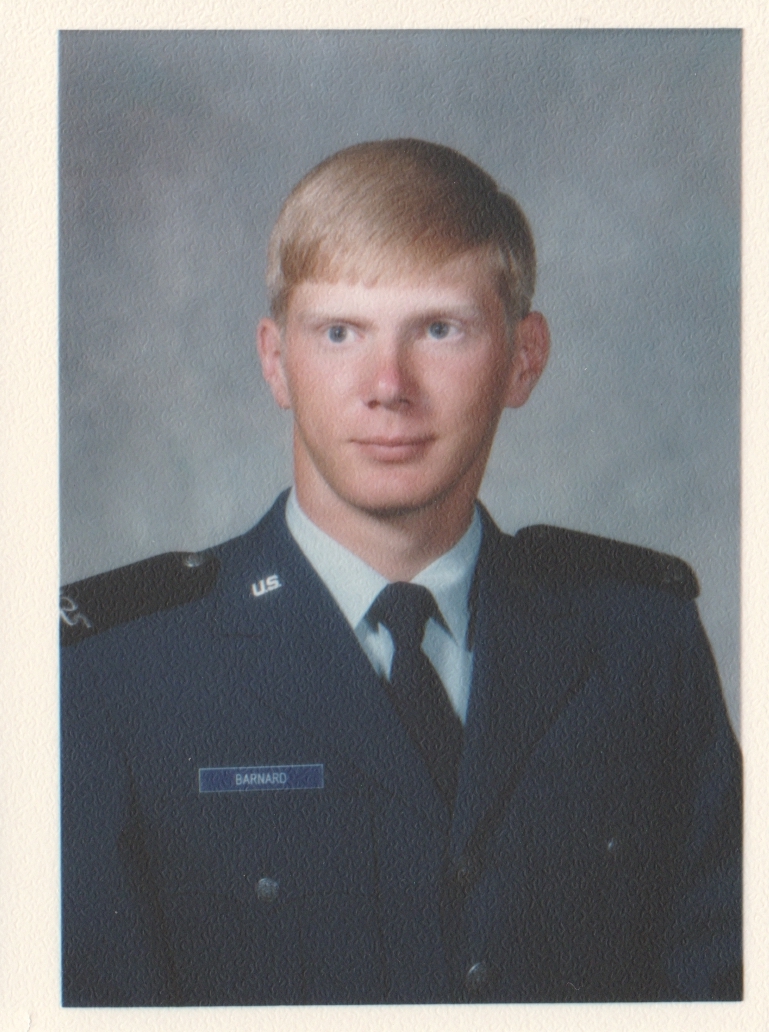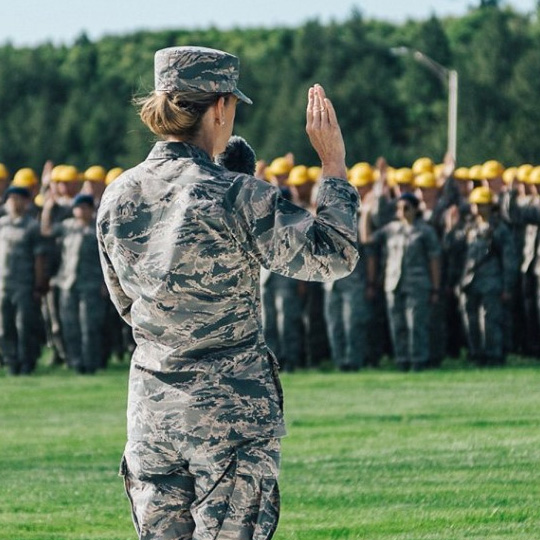1. Let& #39;s talk about The Code, shall we? It has a lot to do with this very week. Photo is Basic Cadet Training, courtesy http://usafa.edu"> http://usafa.edu . <THREAD>
2. My military service is minimal - but I did complete Basic Cadet Training. This is me 45 years ago, give or take a week. The black shoulder boards provide proof I completed Basic Cadet Training (BCT, pronounced "beast").
3. Almost everyone has heard of military "basic training" and heard that it& #39;s considered rigorous. Not-fun, even. You may have experienced it yourself. https://www.usafa.edu/military/basic-cadet-training/">https://www.usafa.edu/military/...
4. Basic Cadet Training is the same - except it& #39;s shorter, possibly more intense, and conducted at 7,258 feet elevation (2,212 m). All military Basic Training programs have their individual advantages. What& #39;s important is that it comes to an end.
5. This is because, you see, Basic Cadets are NOT yet Academy Cadets. Not until Acceptance Day, for those who make it. Here is the Class of 2024 acceptance parade, August 10, 2020. https://www.usafa.af.mil/News/News-Display/Article/2309248/academy-cadets-celebrate-acceptance-day/">https://www.usafa.af.mil/News/News...
6. Here are the numbers. Of the 1,464 appointed Cadets who showed up for Basic Cadet Training on June 30, 1975, 900 graduated as the Class of 1979. That& #39;s 39% attrition - and about a third of those didn& #39;t make it through Basic Cadet Training.
7. But wait, there& #39;s more! You need to understand how tricky this is before I get to the point.
8. What& #39;s strange is that being allowed to show up at all is a weird process. It& #39;s not like a normal college admission, nor is it like being drafted to an athletic team.
9. First you need a nomination from your Member of Congress. Your representative can nominate up to ten people for whatever slots are allocated/available. Here is Angie Craig& #39;s fact sheet. It& #39;s not easy! https://craig.house.gov/military-academy">https://craig.house.gov/military-...
10. In my own case, by time I got the nomination, I& #39;d already accepted admission at another college. I& #39;d already paid the deposit. At that point I declined the other college, explained why, and asked that they apply my deposit to their scholarship fund. They were gracious.
11. The Academy looks at three areas - academic, leadership, physical. The first two are much like other colleges. Scores, transcripts, letters.
12. What& #39;s interesting, though, is the Candidate Fitness Assessment. All is NOT as it seems. https://www.academyadmissions.com/requirements/physical/">https://www.academyadmissions.com/requireme...
13. You see, the test is designed to see who REALLY wants it, versus everyone else. Anyone conducting the test will tell you that they know the difference with the very first of the six tests.
14. It was obvious who had spent an entire year preparing for that specific test, and who had not bothered training for that SPECIFIC test. That was a long year - and I got the appointment.
15. So did the 1,463 other Basic Cadets. It was weird for most of us to be among people better than ourselves in every way. Even so, Basic Cadet Training went about as you& #39;d expect. We were literally decimated, with one in ten departing that summer.
16. Now we can get to the point. That& #39;s what it takes to become a Cadet at ANY of the U.S. Service Academies. There& #39;s a LOT of work to get there in the first place, and that& #39;s the STARTING point for Basic Cadet Training. And my, do the instructors know it!
17. During Basic Cadet Training (and before), we hear about the Honor Code - but we& #39;re not yet subject to it. Here& #39;s the in-depth reference. http://www.christianfighterpilot.com/articles/files/handbook.pdf">https://www.christianfighterpilot.com/articles/...
18. "We will not lie, steal, or cheat, nor tolerate among us anyone who does."
19. There& #39;s something interesting about The Code - and it applies to twitter. But first, what& #39;s the transition point?
20. At the end of Basic Cadet Training, whoever is left standing (roughly 85-90% of us, my year) is formally accepted into the Cadet Wing - and not until then. Only then are we awarded those shoulder boards, our insignia of rank.
21. Fun Fact: Those shoulder boards signify a higher military rank than any Sergeant Major. https://mwi.usma.edu/yes-sergeant-actually-west-point-cadet-outrank/">https://mwi.usma.edu/yes-serge...
22. The Honor Code, quoted above, is owned entirely by the Cadet Wing. It& #39;s not part of any military regulation and not part of the UCMJ (military law). It& #39;s owned and administered by the cadets themselves.
23. Here& #39;s the first of the important parts. What happens if someone breaks the Code? "The presumptive sanction is disenrollment." (Handbook linked at 17 above, page 43, paragraph 3.2.2.3.13.2).
24. So, say something intentionally deceptive, or, say, copy an answer on a test? Or even DISCUSS an answer on a test? The default result is that you& #39;ll be expelled from the USAFA. It& #39;s that simple.
25. There are other possibilities - not relevant here - but you get the idea. The Honor Code is taken rather seriously. And yes, people do report themselves for Honor Code violations. We embrace The Code as part of the Cadet Acceptance ceremony, shoulder boards now in place.
26. So what& #39;s the next point, and how does it apply to Twitter today? It& #39;s the so-called "toleration clause."
27. Suppose the Code were "We will not lie, steal, or cheat." That& #39;s the rule, right? Now suppose that we all know Cadet X is copying answers on the Physics test. That& #39;s HIS OR HER problem, right?
28. And so it is. But do you see how the Code becomes meaningless? X cheats his or her way through the Academy, so what& #39;s the point? How can I trust anyone, knowing they might be choosing to do the same as X?
29. That& #39;s why the "toleration clause" is the backbone of the code. (And yes "backbone" is ALWAYS the word used here.) If I know that X is cheating, and do not confront the situation, I am guilty of an equally-serious Honor Code violation.
30. The presumptive sanction for my looking the other way is disenrollment (being expelled). What if I just walk away? Nope. That& #39;s tolerating the situation.
31. So. Do you see what the atmosphere is like as we ALL choose to live this way? We can trust the other person to represent the truth, and we can trust the other person to not ever tolerate an untruthful situation.
32. NOW WE COME TO THE POINT.
33. We have trolls - not exactly a surprise - who have been actively stalking and harassing people here. Standard policy is "don& #39;t engage." Why? Because twitter rewards engagement. One objective is to provoke a reaction. Distract us from what& #39;s important.
34. Said trolls have long since blocked me, so I don& #39;t see the bad behavior (to put it delicately). What I DO see, is people whom I esteem, who follow me and vice versa, taking part in the troll activity.
35. To me, that& #39;s a direct connection to the Toleration Clause. This is not about the Honor Code itself; it& #39;s about the Toleration Clause.
36. I can& #39;t engage. The trolls win. I can& #39;t ignore - because I continue to believe in the toleration clause. https://www.usafa.org/News/SwearingIn2019">https://www.usafa.org/News/Swea...
37. That, sorry to say, is why I blocked a stack of my followers this week, one by one. I won& #39;t impose my standards on others, but I can definitively state "this is not okay." (Photo from link at 36)
/end
/end
38. To continue. It& #39;s important to share the fact that those sorts of people are still out there. We all kinda know what it means to be a Marine (from the outside), and we& #39;re pretty sure that if things get bad we want & #39;em in the area.
39. I feel badly about sharing things like this story. Why? Because I never graduated. I don& #39;t want to imply that I& #39;m on the same level as those who did. That& #39;s actually why I went through all that bit about Basic Cadet Training. It& #39;s not part of the story.
40. So what is THAT point? It& #39;s that the Cadet Honor Code is as much mine as any member of the Long Blue Line, meaning all those who graduated the USAFA, Class of 1959 onwards.
41. That& #39;s true of every Cadet who made it to the end of their first summer and were then, and only then, formally accepted into the Cadet Wing.
In fact... there& #39;s more. Perhaps I should share.
In fact... there& #39;s more. Perhaps I should share.
42. You see, something happened in 1984 - long past my time. The Honor Code was expanded to become the Honor Oath.
43. “We will not lie, steal, or cheat, nor tolerate among us anyone who does. Furthermore, I resolve to do my duty and to live honorably, so help me God.”
The "so help me God" was later formally made optional.
The "so help me God" was later formally made optional.
44. So why the difference? The Oath, like the Code, is aimed at being self-evident. You see it, or hear it, you get it. Easy.
But... do you see the difference?
But... do you see the difference?
45. The second sentence expresses a forward-looking INTENT, whereas the first sentence is a CONSTRAINT on behavior. The first is WHAT, the second is HOW.
46. Why was that added 30 years after the original? I don& #39;t know - it was past my time. But there& #39;s more...
47. Again, this is past my time, so let me quote directly from the Academy web site.
https://www.usafa.af.mil/News/Features/Article/649921/the-contrails-honor-oath/">https://www.usafa.af.mil/News/Feat...
https://www.usafa.af.mil/News/Features/Article/649921/the-contrails-honor-oath/">https://www.usafa.af.mil/News/Feat...
48. "In a tradition begun with the acceptance of the Class of 1998, the entire wing also takes the oath while facing the incoming class at the acceptance parade. This is not only a re-affirmation of the Wing’s commitment to the Honor Code, but represents our common commitment to
49. "enforce the code among ourselves.
"In taking the Oath, cadets pledge to place personal integrity, the interests of the wing, and the Air Force ahead of whatever personal advantages might accrue from lying, stealing, cheating, or tolerating violations of the code.
"In taking the Oath, cadets pledge to place personal integrity, the interests of the wing, and the Air Force ahead of whatever personal advantages might accrue from lying, stealing, cheating, or tolerating violations of the code.
50. "The Honor Code is the proudest tradition of our Academy and has remained unchanged since it was first accepted by the Class of 1959 as the minimum standard. It is one of our most distinguishing characteristics, and whether or not that tradition remains viable is up to each
51. "individual to live honorably and with a sense of integrity in doing the right thing."
52. Do you see what now happens? At the beginning of the academic year, in August, the entire Cadet Wing (sophomores, juniors, and seniors) turns to the new survivors of Basic Cadet Training. And, facing the incoming Cadets, re-asserts the oath.
53. The entire student body turns to the incoming freshmen, and repeats that oath of trust - to the incoming class.
Surely THESE are the sort of people you& #39;d like by your side as we clean up 2020& #39;s mess?
Surely THESE are the sort of people you& #39;d like by your side as we clean up 2020& #39;s mess?
54. There& #39;s value in building trust, one way or another. Build trust, earn trust.
55. Am I special because I can quote something from 45 years ago? Nope. But to be part of something that& #39;s larger than yourself... yup. That& #39;s special, and usually important.
56. Others have served in countless different ways, usually more significant. But this is the story *I* can share, even though I& #39;m so hesitant to do so.
57. And... yup... I have more blocking to do. I& #39;m not attacking by blocking. It& #39;s not about the troll, or the troll& #39;s actions. It& #39;s about *me* and what& #39;s important to *me*.
/end
/end
58. Quoting @SimonBirchh with permission, "...it feels good knowing we& #39;re not all alone out here so we& #39;re in a real catch 22" - and that& #39;s why this thread is perhaps important.
59. Not everyone was privileged to embrace the Honor Code as I described. As of the time of my story, zero women were so privileged - but the following year, 1976 bringing in the Class of 1980, that changed.
60. But with so much chaos - intentional, deadly chaos - making up 2020, it& #39;s good to know The Code exists, and that tens or hundreds of thousands of men and women live it. That gives each of us permission to follow our best instincts. Do you see what @SimonBirchh and I mean?
61. But how might one develop trust online? That& #39;s a problem, given that we& #39;re surrounded by people skilled in faking us out. But it& #39;s like with the real world, in my view... observation over time, meaning a year and more.
62. Work with the person, get to know the person, take note of the consistencies and inconsistencies. Have I been taken in? Many times! But I& #39;ve also had many cases where someone gave me a nudge, saying "be careful." We collectively have each others& #39; backs.
63. It& #39;s interesting (to me) when secrets come out nearly 50 years later. Some pieces fell into place... I can find no trace online, so the information might actually be secret... but I found the hint in my own basement - in the USAFA yearbook.
64. As if a piece of inside information was hidden in plain sight. Kinda cool when it& #39;s noticed!
65. To put numbers on the "toleration clause"... I individually blocked 77 accounts this week. None of them were attacking ME, and none of them were being magats. All were visibly celebrating stalking and harassment.
When you& #39;re a victim of that many separate accounts: ouch.
When you& #39;re a victim of that many separate accounts: ouch.
66. Melville notes the inherent value in looking out for each other. https://twitter.com/JamesMelville/status/1317224833562849281">https://twitter.com/JamesMelv...

 Read on Twitter
Read on Twitter




